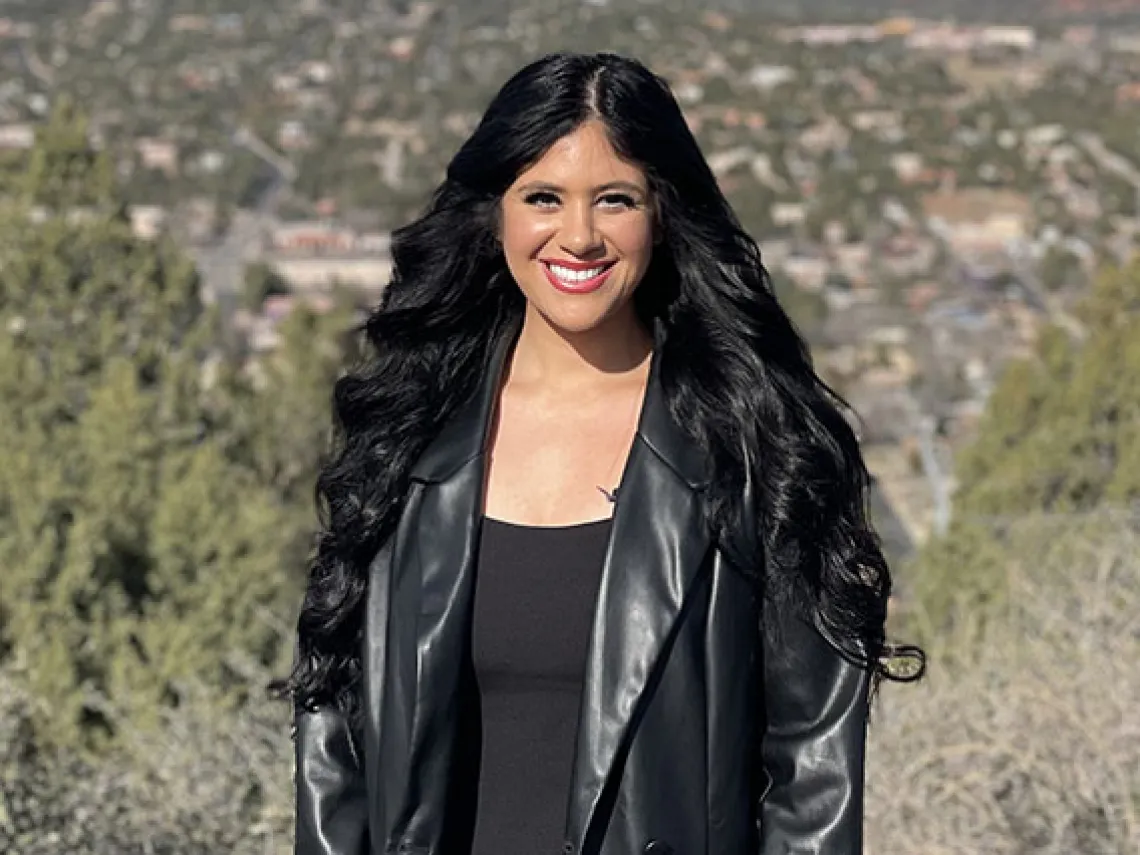Class of 2024: SJD Grad Charts a Path Toward Indigenous Sovereignty

Name: Melemaikalani “Mele” Moniz
Degree: Doctor of Juridical Science (SJD)
Hometown: Kailua, Hawaii
LLM: The University of Oregon School of Law
JD: The Catholic University of America Columbus School of Law
Undergrad: Marist College
What motivated you to pursue a degree in law, and how has that motivation evolved throughout your time in law school?
I am Native Hawaiian or Kānaka ‘Ōiwi. As a Kānaka ‘Ōiwi, I grew up knowing that I have a kuleana or sacred reciprocal responsibility to my lāhui or nation to help ensure our survival. Initially, I chose to pursue a JD to utilize the legal system to assist my lāhui. However, after understanding the implications of systemic racism within the settler system as denoting an intrinsically racist system, I opted to pursue an LLM and SJD to ascertain alternative means for liberation.
Why did you choose University of Arizona James E. Rogers College of Law?
I chose the University of Arizona James E. Rogers College of Law because of the Indigenous Peoples Law and Policy Program (IPLP). In my previous studies, I hadn't had the opportunity to study under indigenous professors. Although I had classes with other Indigenous students, we had not discussed nor studied the effects of legal systems on different Indigenous Peoples around the world. As such, the opportunity to study law with a multitude of indigenous perspectives compelled me to pursue the IPLP program above all else.
Can you tell us about your dissertation?
In my dissertation, I am exploring equitable changes to laws and policies affecting the mind, body, and spirit of Kānaka ‘Ōiwi and, by extension, our lāhui or nation as an exercise of ea or sovereignty to maximize equity within the settler system and to facilitate healing on our path toward liberation. Part I of my dissertation is Decolonizing the Mind as An Exercise of Ea. Part II of my dissertation is Decolonizing the Body as an Exercise of Ea. Part III of my dissertation is Decolonizing the Spirit as an Exercise of Ea. Each section of my dissertation assists in ascertaining the extent to which we as ‘Ōiwi can exercise our determinations of truth to assist in healing and repairing our pilina or relationships while simultaneously asserting our right to political sovereignty as a subjugated people forced to live within the settler system.
Which courses or professors had the most significant impact on your legal education and why?
The two courses that had the most significant impact on my legal education were the Legal Protection of Indigenous Cultural Heritage taught by Professor Rebecca Tsosie and International Human Rights and Indigenous Peoples taught by Professor Robert A. Williams, Jr. In the course taught by Professor Rebecca Tsosie, we explored issues pertaining to the cultural rights of Indigenous Peoples to ascertain how to effectively use the law to protect tangible and intangible aspects of Indigenous Cultural Heritage. The paper Professor Tsosie helped me develop evolved into Part II of my dissertation. In the course taught by Professor Williams, we examined comparative perspectives in the development and application of domestic and international legal systems to Indigenous Peoples through critical legal theory, cases, and discussions with Indigenous advocates from around the world. Both classes opened my perspective and challenged me to grow as an ‘Ōiwi advocate while also gifting me the opportunity to learn from two foremost Indigenous legal scholars.
What are your immediate plans post-graduation? (e.g., joining a firm, pursuing further studies, etc.)
After graduation, I plan to return home to Hawaii to work for the Office of Hawaiian Affairs (OHA). I am grateful for the opportunity to return to my one hānau or ancestral birthsands to support my lāhui or nation.
How do you hope to make a difference in the legal field or in society through your career? Future career plans?
I believe that in following my path of kuleana, I innately am making a difference for my lāhui or nation as I can then offer my unique contribution in furtherance of our liberation.
Looking back on your experience at the college, what would you have done differently or what advice would you give to your younger self?
I wish I had taken the opportunity to take classes in other disciplines. I sincerely enjoy reading legal scholarship and have been thrilled to see the extent to which law intersects with so many other disciplines. It would have been exciting to explore more of this intersection in an academic setting with experts in those particular fields.
What will you miss most about University of Arizona Law and/or Tucson?
I truly believe that our relationships in their many forms are what makes life worth living. Whether it be family, friends, acquaintances, or even our non-human relations, the relationships we hold enhance our life, awaken our truth, and inspire our direction. I will miss the extraordinary people I’ve met here - at the University of Arizona and in Tucson - who have enhanced my life, awakened my truth, and inspired my direction.
What are you most proud of while at the University of Arizona Law?
I am most proud of my students. As a teaching fellow for the BA in Law program, I had the privilege of teaching incredible students who inspired me as a teacher and as a developing professional. My professors have always been meaningful to my growth. I hope I offer the same support to my students.
Message for your fellow Class of 2024:
O ka pono ke hana ‘ia a iho mai na lani
Blessings come to those who persist in doing good
